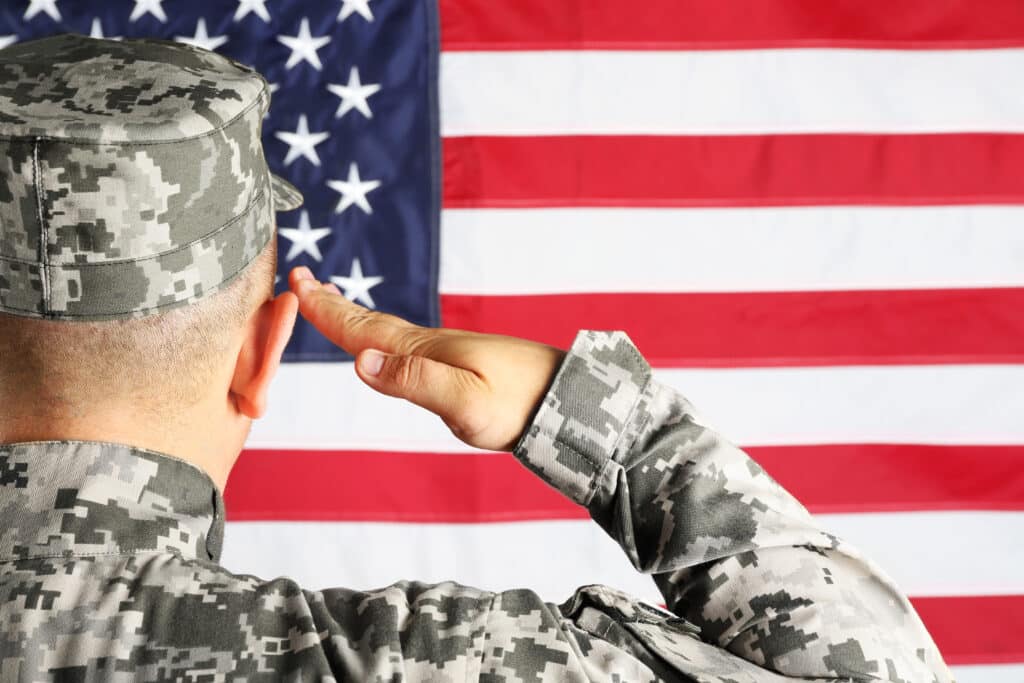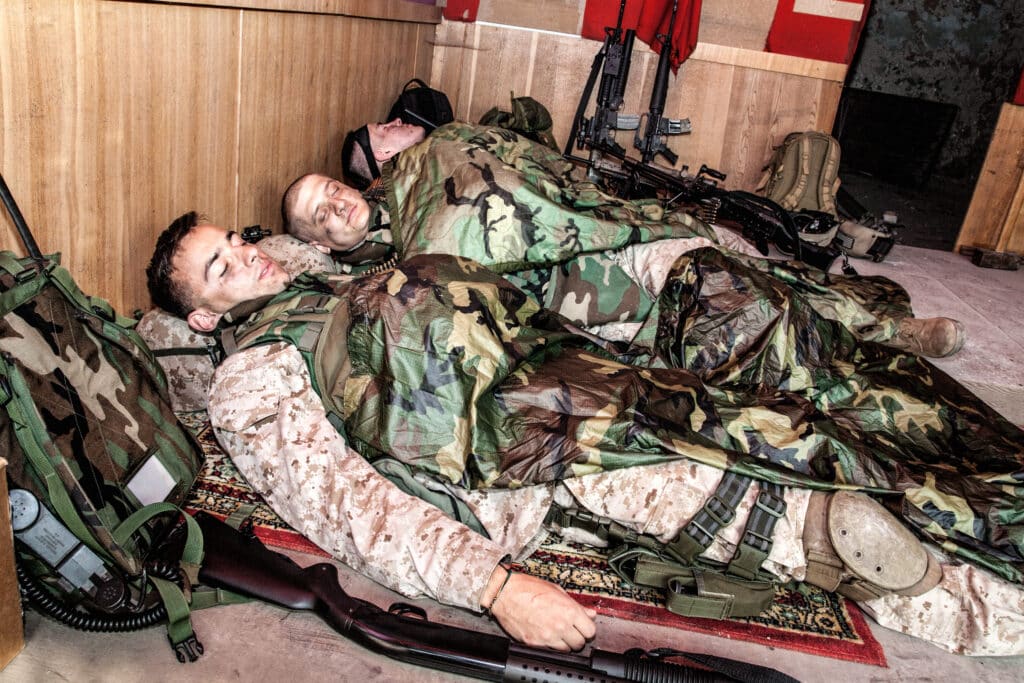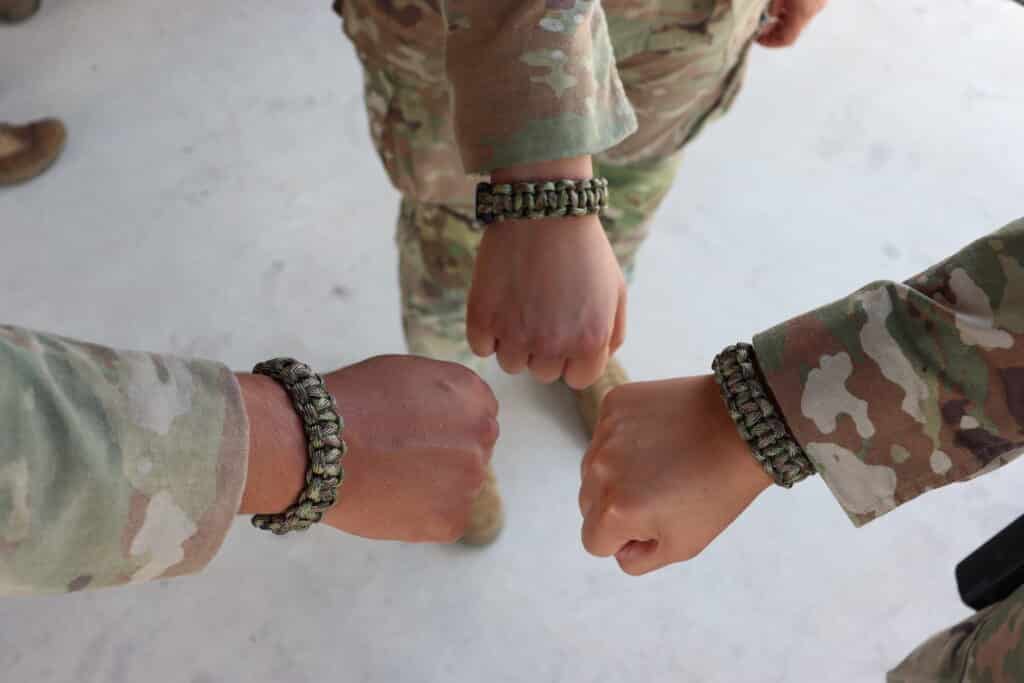Self-Care in the Military —Is it Even Possible?
September 16, 2025
As we reflect on National Self-Care Awareness Month, our thoughts turn to the brave men and women serving in our Armed Forces.
These Service Members dedicate themselves to duty with unwavering commitment—often working long hours under immense pressure, in environments that are anything but comfortable. Furthermore, some are stationed far from home, separated from loved ones, and facing harsh conditions that test their limits daily.

This begs the question—is self-care even possible in the military?
We Believe Self-Care is Not Just Possible—It’s Essential
In a culture that often celebrates endurance over rest and stoicism over vulnerability, self-care can feel counterintuitive to the military mindset. But the truth is, Service Members are not machines—they are human beings with bodies that fatigue, minds that carry weight, and spirits that need renewal.
Prioritizing self-care doesn’t weaken the mission—it strengthens it.
When warriors are well-rested, emotionally supported, spiritually grounded, and mentally resilient, they’re better equipped to lead, respond, and recover. Self-care is not a detour from duty—it’s part of the path. It’s how we honor the whole person behind the uniform.
So yes, self-care in the military is possible. And more than that—it’s a form of readiness, a quiet act of courage, and a powerful way to sustain those who serve.
Warrior Wellness and Self-Care Strategies
We want to encourage Service Members to care for their physical, mental, emotional, and spiritual well-being, even in the most demanding circumstances. It’s okay to prioritize health while continuing to serve with honor.
Here are some self-care tips we think will be helpful:
Mental Health Self-Care Tip: Listen to Chill Drills and Take Advantage of Mindfulness Tools
In the chaos of military life—whether it’s the grind of training, the intensity of deployment, or the emotional toll of separation—finding moments of calm can sometimes feel impossible. That’s where Chill Drills by Military OneSource come in.
Led by therapist Heidi J. Bauer, these free, guided audio exercises are designed specifically for active-duty Service Members to help regulate stress, restore focus, and promote mental resilience. Chill Drills lower baseline stress levels and can help Service Members be better prepared to deal with pressure in the future.
Each drill targets a specific challenge:
- Tuning In uses progressive muscle relaxation to reverse stress symptoms
- Releasing Stress helps clear negative thoughts through body awareness
- Easing Back Pain targets tension in the neck, shoulders, and back
- Getting to Sleep supports better rest in noisy or unfamiliar environments
- Music to Chill By offers calming soundtracks for wind-down moments
These tools aren’t just feel-good extras—they’re mission-critical mental fitness exercises. Regular use can lower stress hormones, reduce emotional reactivity, and improve sleep quality, which directly impacts readiness, decision-making, and overall well-being.
Learn more about Chill Drills and download the app for free.
Physical Health Self-Care Tip: Prioritize Sleep Hygiene
Sleep is often sacrificed in fast-tempo environments like deployments and training exercises. Service Members are sometimes expected to perform without sleep for up to 48 hours at a time or even longer!

However, we recommend that Service Members treat sleep as a strategic asset. Even small shifts in routine and mindset are powerful methods of self-care.
Here are a few ways to prioritize sleep hygiene, even when rest feels out of reach:
Create a Consistent Wind-Down Ritual
Even a 5-minute routine—like stretching, prayer, journaling, or listening to a Chill Drill—can signal the body to prepare for rest. Repetition builds resilience.
Optimize Your Sleep Environment
Use blackout masks, earplugs, or noise apps to block out distractions. In the field, choose dry, flat ground with natural wind protection and elevate gear to stay warm and dry.
Change Into Dry, Clean Clothes Before Bed
Even swapping out socks or a shirt can reduce discomfort and help regulate body temperature.
Protect Short Sleep Windows
If you only have 4 hours, make them count. Avoid caffeine, blue light, and heavy meals before rest. Even short naps can restore alertness and reduce sleep deprivation.
Emotional Health Self-Care Tip: Engage in Constructive Outlets
Anger, frustration, and grief are not signs of weakness—they’re signs of humanity. For Service Members, these emotions often simmer beneath the surface. Unfortunately, they are usually tightly contained by the demands of military bearing, mission focus, and the cultural expectation to “embrace the suck.”
It’s true that emotional suppression may be adaptive in combat. However, research shows that long-term avoidance can lead to burnout, substance misuse, and even suicidal ideation.
That’s why creating safe, judgment-free outlets for emotional expression is not just helpful—it’s necessary. Here are a few ideas to promote emotional wellness:
Journaling
Writing down thoughts and feelings helps Service Members process experiences, identify triggers, and gain clarity. Even a few lines a day can reduce emotional overload and build self-awareness.
Art and Creative Expression
Drawing, painting, making music, or crafting can bypass verbal barriers and offer a powerful release. These practices allow emotions to surface in symbolic, non-threatening ways—especially helpful for those who struggle to name what they feel.

Making paracord bracelets is a perfect example of creative expression. They are both therapeutic to make and useful in the field. They offer a tactile, repetitive motion that can calm the nervous system—especially during downtime or high-stress moments. Each knot tied becomes a quiet act of focus and care—proof that even in the midst of duty, creativity and healing can coexist.
Prayer and Spiritual Reflection
Faith-based practices offer grounding, comfort, and a sense of connection. Whether it’s a whispered prayer, devotional reading, mindfulness meditation, or time spent in nature, spiritual rituals and grounding techniques can restore peace and purpose.
Peer Support
Talking with someone who “gets it”—a fellow warrior, chaplain, or peer support specialist—can validate emotions and reduce isolation. Programs like VA Peer Support and Military & Family Life Counseling (MFLC) offer confidential, trauma-informed spaces for healing.
Spiritual Health Self-Care Tip: Align Your Inner Compass
In the military, where uncertainty, separation, and sacrifice are part of daily life, spiritual health becomes a quiet anchor—a source of strength that transcends circumstance. When Service Members are spiritually grounded, they’re better equipped to face adversity, lead with integrity, and heal from within.
Spiritual self-care isn’t about perfection—it’s about presence. It’s about making space for reflection, meaning, and renewal, even in the most demanding environments.
Here are a few ways to nurture spiritual health:
Practice Daily Reflection
Take a few minutes each day to pause, breathe, and reflect. Whether through prayer, meditation, or journaling, this practice helps Service Members reconnect with their purpose and values.

Engage with Devotional or Sacred Texts
Reading Scripture, devotionals, or inspirational writings can offer comfort, clarity, and encouragement. Even a single verse or quote can shift perspective and restore hope. In moments of uncertainty or isolation, these sacred words can serve as a steady compass—reminding Service Members that they are seen, supported, and never alone.
Find Sacred Spaces—Wherever You Are
Spiritual connection doesn’t require a chapel. A quiet corner, a sunrise, a moment under the stars—these can become sanctuaries for the soul. Nature often speaks when words fall short.
Seek Community and Chaplain Support
Military chaplains and faith-based groups offer confidential, compassionate support. They understand the unique spiritual challenges of service and can help Service Members explore faith, grief, and purpose without judgment.
Embrace Rituals That Restore
Lighting a candle, reciting a prayer, listening to worship music, or creating a gratitude list—these small rituals can become lifelines in times of stress or isolation.
Talk About Faith Without Fear
Spiritual conversations can be healing. Whether with a peer, mentor, or chaplain, sharing beliefs and doubts can deepen connection and foster emotional resilience.
Final Thoughts on Self-Care
Taking care of yourself isn’t a luxury; it’s a lifeline.
Whether through sleep, mindfulness, creative expression, or spiritual grounding, these practices help Service Members stay mission-ready while honoring their humanity. By embracing holistic wellness, we remind our warriors that they are more than their rank or role—they are whole people, worthy of care.
This National Self-Care Awareness Month, let’s continue to uplift those who serve by encouraging rest, reflection, and renewal—because even the strongest warriors need space to heal.
About the Author

Bethany Heinesh is a proud Marine Corps Veteran living in San Antonio, Texas. Bethany holds a Master of Arts in Administration-Communication Arts from the University of the Incarnate Word and a B.A. in Public Relations (Minor Religious Studies) from the University of Houston.


